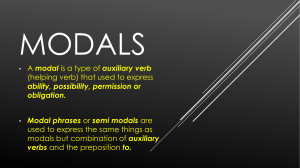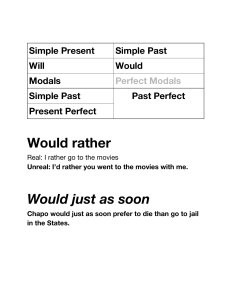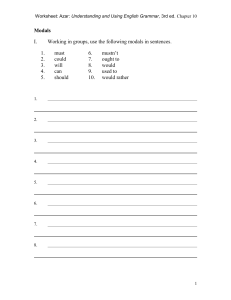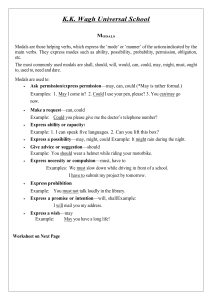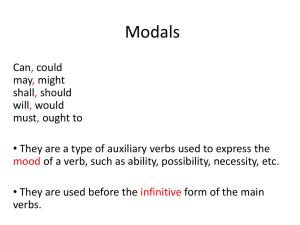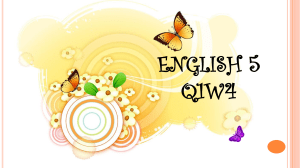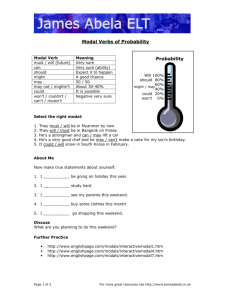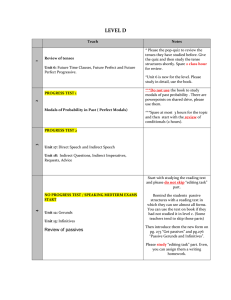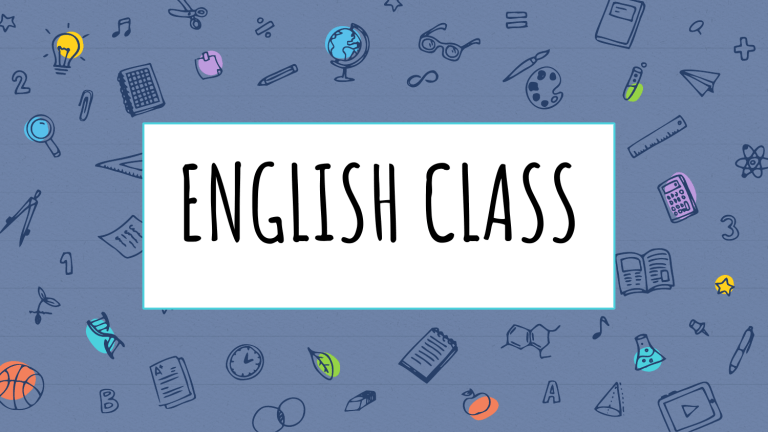
ENGLISH CLASS Prayer Dear Father, We thank you for everyone gathered here now. Thank you that you know each of us by name and have caused us to walk with You. We say that we are dependent on You and our trust is in You completely. As we surrender ourselves in adoration we ask that You would come by Your Holy Spirit and inspire our hearts today. Come fill our lives with Your love. Fill our conversations with Your grace and truth. Fill this class with Your presence. We ask this for Your glory and praise. Amen. 2 Guess the Word 4 r o l e s my roles my roles • • • • As a daughter/son, _______________________. As a student, ___________________________. As a friend, _____________________________. As a person, _____________________________. 6 my roles • As a daughter/son, I must respect my parents. • As a student, I should do my best to understand the lessons. • As a friend, I have to make time for my friends. • As a person, I must live an honest life. 7 my roles • As a daughter/son, I must respect my parents. • As a student, I should do my best to understand the lessons. • As a friend, I have to make time for my friends. • As a person, I must live an honest life. 8 modals 10 Types of Modals • Modals of Permission • Modals of Obligation • Modals of Prohibition 11 Group Activity Each group will discuss the type of modal assigned to them and present example sentences. • Group 1 – Modals of Permission • Group 2 – Modals of Obligation • Group 3 – Modals of Prohibition 13 Before the discussion of the given topic, each group must come up with their unique name and a yell/cheer. The yell/cheer must have “modals.” 14 Rubric • Presentation • Examples • Team Effort • Total 10 5 5 20 15 Checking of LTs Answer: 17 1. b 6. h 2. a 7. i 3. e 8. j 4. d 9. g 5. f 10. c has to 18 19 20 21 22 MODALS OF PERMISSION 1. Permission is an act of giving consent or authorization. In stating permission, modals to be used include can, could and may. a. Can is used to ask for and give permission. ✘ Examples: Can you give me your number? ✘ Can you help me with this? ✘ I can do it if you want me to. 23 MODALS OF PERMISSION b. Could is also used as a more polite and more formal modal in asking permission (which may not be given). Examples: I could possibly ask my mom to cook it for us. Could I interview the mayor? Could you lend me your book? 24 MODALS OF PERMISSION May is the most polite and formal modal used in asking and giving permission. Examples: Medical practitioners affected by COVID-19 may now claim their financial support from the government. Teachers may now distribute the modules to the learners. May I borrow your book, please? 25 MODALS OF Prohibition 2. Prohibition is the act of disallowing or prohibiting someone in performing or doing something. Modals showing prohibition include can’t and must not/mustn’t. a. Can’t is used in dealing with something against rules, laws and signs. This is used when the speaker is not the one who sets the rules. Examples: You can’t go out during the community quarantine. (Quarantine Policy) 26 MODALS OF Prohibition The company can’t apply for motion for reconsideration. (Legal Proceeding) You can’t buy any alcoholic beverages due to liquor ban. (Liquor Ban Policy) 27 MODALS OF Prohibition b. Must Not/Mustn’t is used in dealing with something that is not permitted. In this context, it is the speaker who sets the rules. Examples: You must not turn off your camera during online class. (Teacher-students) Mustn’t you eat the fruits inside the fridge? (Mother to child Salome must not tell my secrets to her friends. (Boss to a colleague) 28 MODALS OF obligation Obligation expresses commitment or duty. Modals used in expressing obligation include have to (has to) and must. a. Has/Have to is used when obligation comes not from the speaker. The obligation is set by an authority, rule or law. Examples: I have to be in the airport before the flight departure. 29 MODALS OF obligation She has to submit her report on time. The company has to pay retrenchment benefits to its employees. 30 MODALS OF obligation b. Must is used when expressing obligation comes from the speaker or from an authority. Examples: I must call my husband now. We must finish the report on time. I must stay away from them. 31 no obligation 4. No obligation expresses the absence of commitment or duty as one may do it or not. Don’t (doesn’t) have to is used to express no obligation. Examples: She doesn’t have to attend the funeral if she is not feeling well. 32 no obligation You don’t have to come to my office in person. You may submit it online. The employees don’t have to come this morning as the activity will start in the afternoon. 33 Additonal modals Should is a modal verb most commonly used to make recommendations or give advice. It can also be used to express obligation as well as expectation. Examples: When you go to Berlin, you should visit the palaces in Potsdam. recommendation You should focus more on your family and less on work. Advice. 34 Additonal modals I really should be in the office by 7:00 AM. obligation By now, they should already be in Dubai. expectation 35 Additonal modals Will" is a modal verb used with promises or voluntary actions that take place in the future. "Will" can also be used to make predictions about the future. 36 Additonal modals Examples: I promise that I will write you every single day. promise I will make dinner tonight. voluntary action He thinks it will rain tomorrow. prediction 37 Additonal modals "Might" is a modal verb most commonly used to express possibility. It is also often used in conditional sentences. English speakers can also use "might" to make suggestions or requests, 38 Additonal modals Examples: Your purse might be in the living room. possibility You might visit the botanical gardens during your visit. suggestion Might I borrow your pen? request 39 Additonal modals "Must" is a modal verb most commonly used to express certainty. It can also be used to express necessity or strong recommendation, 40 Additonal modals Examples: This must be the right address! certainty Students must pass an entrance examination to study at this school. necessity You must take some medicine for that cough. strong recommendation Jenny, you must not play in the street! prohibition 41 42 1. Have to be / must be 2. believe/Know/ 3. Have 4. Shouldn’t be /mustn’t be 5. Can’t be/Shouldn’t be/ mustn’t be 6. Can be/Have to be/ must be 7. 7.think/suggest 8. Should be 43 8. Should be 9.Can help/support 10.Must be/ should be 11.can 12 might do 13 can do/have to do 14 can get rid/ surpass/overcome 15. can/ must /should 44 THANKS! 45
